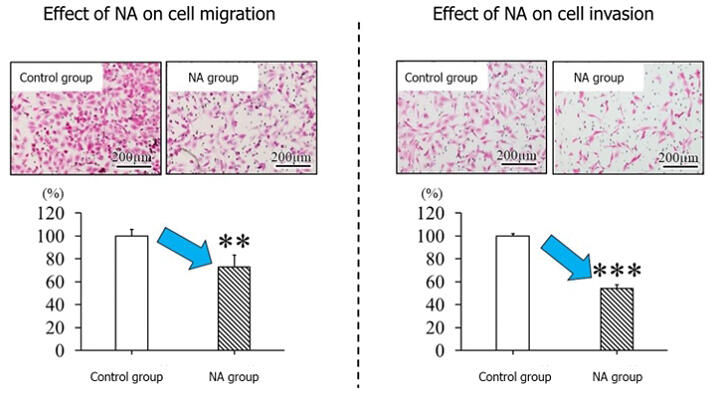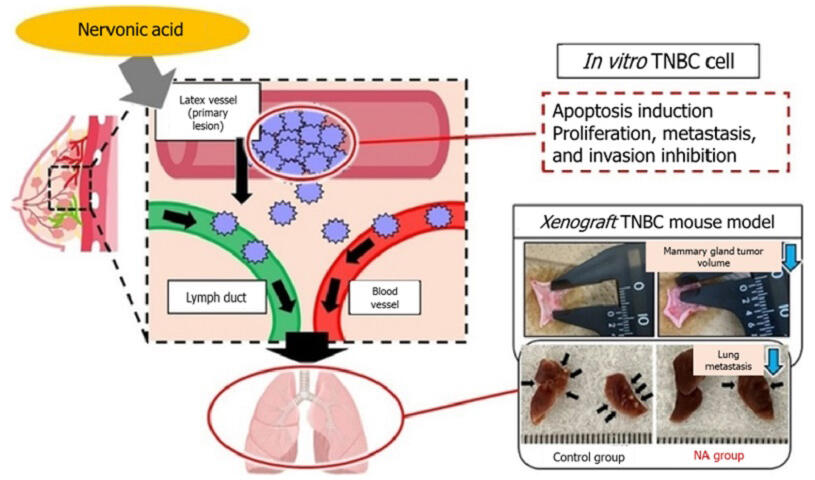A research group led by Professor Tatsuki Itoh from the Department of Food Science and Nutrition, Faculty of Agriculture at Kindai University, in collaboration with Kindai University Hospital, has announced that "nervonic acid," a fatty acid found in flaxseed and fish oil, demonstrates anticancer effects against refractory breast cancer. This suggests the possibility of preventing breast cancer through diet. There are expectations that this could lead to the development of new therapeutic drugs for breast cancers that are resistant to existing medications. The group's findings were published in Journal of Oleo Science, an international academic journal, on April 1.

Provided by Kindai University
Breast cancer is reported to be the most common site-specific malignant tumor among Japanese women. Breast cancer is broadly classified into four types, with the difficult-to-treat "triple-negative" type (TNBC) accounting for about 15% of all cases. This is not influenced by female hormones and also has no HER2 receptors. While general anticancer drugs are used for treatment, approximately 40% of patients experience recurrence, and the five-year survival rate is only about 50%, making the prognosis significantly worse compared to other breast cancers.
Fatty acids contained in natural products affect diseases such as cancer. For example, palmitic acid found in palm oil has been reported to inhibit prostate cancer cell proliferation, while linoleic acid in soybean oil promotes liver metastasis of colorectal cancer. Nervonic acid, found in flaxseed and fish oil, has previously been shown to have anti-inflammatory effects, and its signaling pathway is known to be related to cancer. However, the effect of nervonic acid on cancer remained unclear.

Provided by Kindai University
In this study, the researchers first investigated whether nervonic acid has anticancer effects against TNBC. When nervonic acid was added to cultured human TNBC cells, a decrease in cell survival rate was confirmed. This decrease was also shown to be due to the induction of apoptosis. Cell proliferation was suppressed throughout the proliferation phase.
Next, they verified whether nervonic acid suppresses TNBC metastasis. When they evaluated "migration" and "invasion" using cultured cells, both were inhibited by the addition of nervonic acid. Nervonic acid suppressed TNBC cell migration by approximately 30%, and this suppression involved the gene expression of cell adhesion molecules CDH1 and CDH2. Additionally, nervonic acid inhibited the expression of MMP2 and MMP9 proteins, basement membrane degrading enzymes in TNBC cells, resulting in an approximately 50% reduction in invasive cells.
When nervonic acid was orally administered to model mice transplanted with human-derived cancer cells in the mammary gland, the tumor volume at the primary site was significantly reduced, and metastasis to the lungs, which is relatively common in breast cancer, was significantly suppressed.
Itoh commented: "Breast cancer has the highest incidence rate, and since refractory breast cancer has a poor prognosis and is difficult to treat, I conducted research to see if anything could be done. When examining various nutrients against refractory breast cancer, nervonic acid was the only one to show an effect. When this happened, my students and I looked at each other with goosebumps, thinking, 'This is it!!' It would fulfill my purpose as a researcher if the consumption of flaxseed oil and fish oil contributes to reducing breast cancer incidence rates and brings happiness to patients. Next, I plan to continue research on pancreatic cancer, which is rapidly increasing in both men and women."
Journal Information
Publication: Journal of Oleo Science
Title: Anticancer Effects of Nervonic Acid in Triple-Negative Breast Cancer
DOI: 10.5650/jos.ess24342
This article has been translated by JST with permission from The Science News Ltd. (https://sci-news.co.jp/). Unauthorized reproduction of the article and photographs is prohibited.




